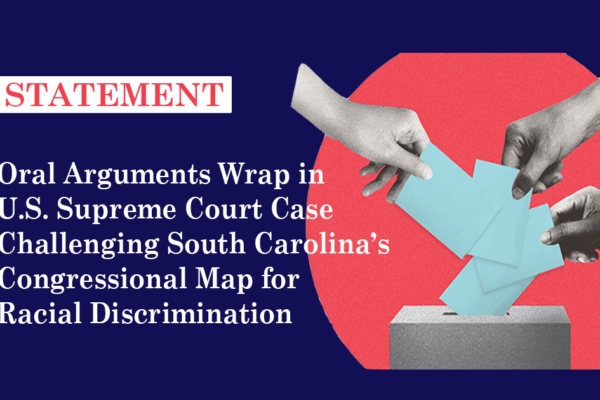WASHINGTON — This morning, oral arguments concluded in Alexander v. South Carolina State Conference of the NAACP, the U.S. Supreme Court case that will determine the fate of South Carolina’s congressional map.
Shortly after the map was enacted, plaintiffs challenged it as a racial gerrymander designed with a discriminatory purpose under the Fourteenth and Fifteenth Amendments of the U.S. Constitution. The case was filed on behalf of the South Carolina State Conference of the NAACP and Taiwan Scott, a Hilton Head resident and member of the Gullah-Geechee community. They are represented by the Legal Defense Fund (LDF), American Civil Liberties Union (ACLU), ACLU of South Carolina, and Arnold & Porter.
In January, after an eight-day trial, a unanimous three-judge panel ordered South Carolina to redraw its 2022 enacted congressional map after finding that the South Carolina General Assembly targeted Black voters by removing more than 30,000 Black Charlestonians out of Congressional District 1 based on their race and to diminish their voting power.
Today, LDF Senior Counsel Leah Aden argued before the Supreme Court on behalf of Black South Carolina voters, explaining why the Court should affirm the panel’s finding of “stark racial gerrymandering.”
“They [legislators] were consistently looking at race because they had an expectation that race was a predictor of how political parties would perform,” said Aden.
“In light of the total record, it reflects that there was a racial target, it reflects that there was a significant sorting of Black people, it reflects unrebutted expert evidence of race rather than party explaining the assignment of voters, it reflects a disregard of traditional redistricting principles — and all of that evidence in total is more than plausible, in the record, for using race as a means to harm individual plaintiffs,” Aden added.
Following oral arguments, plaintiffs held a press conference where they highlighted what’s at stake in this critical voting rights case:
Brenda Murphy, president of the NAACP South Carolina State Conference and plaintiff: “Black voters in South Carolina deserve to fully and fairly participate in a democratic process where we are fully represented and our communities are accounted for. It is crucial that every voter is fairly represented in our democracy, and we hope the court rules in favor of this fundamental truth.”
Taiwan Scott, plaintiff: “For too long, our state’s electoral process has silenced us and severely weakened the ability of our communities to be fully and fairly represented and accounted for. South Carolina’s congressional map is the latest instance in our state’s long, painful history of racial discrimination that must be remedied.”
Leah Aden, LDF’s senior counsel: “We are confident that after a full review of the record, the Supreme Court will agree with the panel’s ruling because the law and facts are on plaintiffs’ side. South Carolina’s Congressional District 1, anchored in Charleston County, is a blatant example of racially discriminatory redistricting. We will not back down from the fight for the constitutional rights and dignity of Black South Carolinian voters.”
Adriel I. Cepeda Derieux, deputy director of the ACLU’s Voting Rights Project: “Today’s argument confirmed what we’ve long known: South Carolina’s Legislature brazenly moved Black voters out of Congressional District 1 for the sake of partisan advantage. This was a textbook racial gerrymander, as the lower court found, and we are confident the Supreme Court will agree.”
Allen Chaney, ACLU of South Carolina legal director: “Win or lose, it cannot be overlooked that today the South Carolina legislature argued, yet again, that its conscious goal was to cheat South Carolina voters out of a fair and representative Congressional map. Voters should choose their representatives, not the other way around.”
John A. Freedman, Arnold & Porter’s senior pro bono counsel: “As today’s argument confirmed, the rights of Charlestonians and all South Carolinians to have their congressional districts drawn in a legal, fair, and non-discriminatory manner were unquestionably violated in this case. We are proud to stand with our co-counsel and clients to vindicate these important principles.”
This case is part of the ACLU’s Joan and Irwin Jacobs Supreme Court Docket.
Stay Informed
Sign up to be the first to hear about how to take action.
By completing this form, I agree to receive occasional emails per the terms of the ACLU’s privacy statement.
By completing this form, I agree to receive occasional emails per the terms of the ACLU’s privacy statement.

